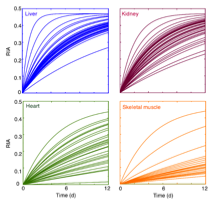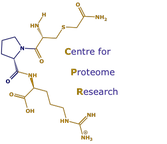
Proteome dynamics
We were the first group to address the importance of proteome dynamics. We maintain that a proteome is not fully characterised until we can explain changes in protein content in the cell in terms of the rates of the opposing processes of protein synthesis and protein degradation. We continue to develop the concepts and methodologies to define proteome dynamics.
Protein characterisation
Comparative proteomics assess the relative amounts of two proteins, but can attain this with relatively little information about the protein. However, there are many studies where we use the methodologies of protein chemistry to complete a detailed characterisation of a single purified protein - for example complete sequencing of lipocalins.
Proteomics methodology development
Proteomics is a nascent field, and there is scope for developments in methodology, strategy and data analysis. We have a number of ongoing projects in proteomics development. Recent achievements include a new approach to absolute quantification (QconCAT) and a method for selective analysis of N-terminal peptides.




